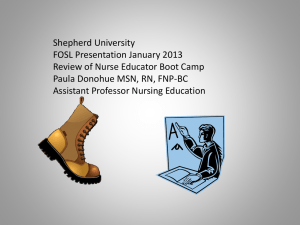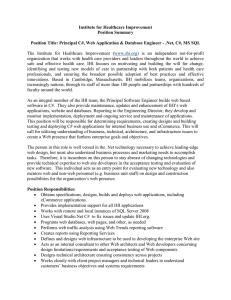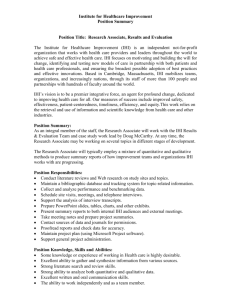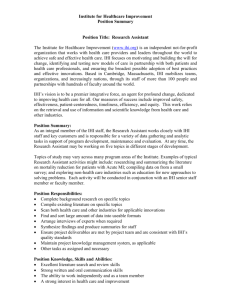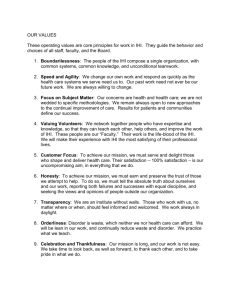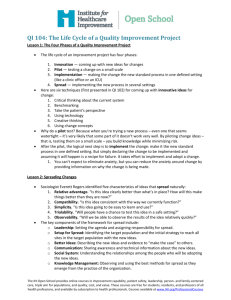Building Nurse Leaders Through the Institute for Healthcare Improvement Open School Student
advertisement
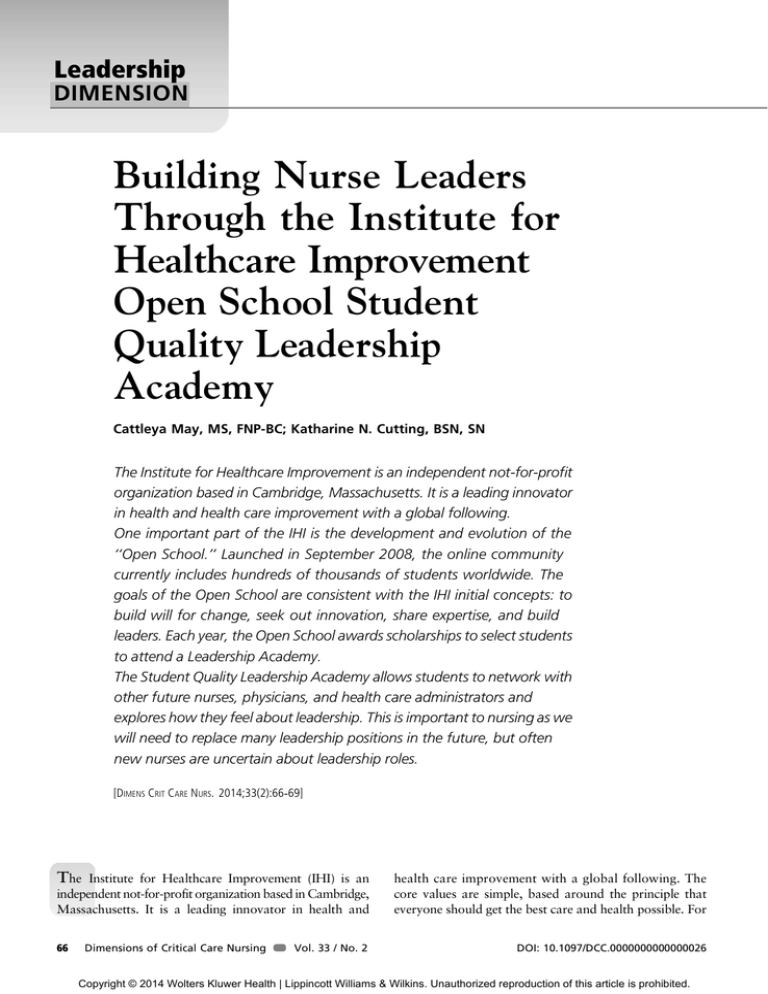
Leadership DIMENSION Building Nurse Leaders Through the Institute for Healthcare Improvement Open School Student Quality Leadership Academy Cattleya May, MS, FNP-BC; Katharine N. Cutting, BSN, SN The Institute for Healthcare Improvement is an independent not-for-profit organization based in Cambridge, Massachusetts. It is a leading innovator in health and health care improvement with a global following. One important part of the IHI is the development and evolution of the ‘‘Open School.’’ Launched in September 2008, the online community currently includes hundreds of thousands of students worldwide. The goals of the Open School are consistent with the IHI initial concepts: to build will for change, seek out innovation, share expertise, and build leaders. Each year, the Open School awards scholarships to select students to attend a Leadership Academy. The Student Quality Leadership Academy allows students to network with other future nurses, physicians, and health care administrators and explores how they feel about leadership. This is important to nursing as we will need to replace many leadership positions in the future, but often new nurses are uncertain about leadership roles. [DIMENS CRIT CARE NURS. 2014;33(2):66/69] The Institute for Healthcare Improvement (IHI) is an independent not-for-profit organization based in Cambridge, Massachusetts. It is a leading innovator in health and 66 Dimensions of Critical Care Nursing Vol. 33 / No. 2 health care improvement with a global following. The core values are simple, based around the principle that everyone should get the best care and health possible. For DOI: 10.1097/DCC.0000000000000026 Copyright © 2014 Wolters Kluwer Health | Lippincott Williams & Wilkins. Unauthorized reproduction of this article is prohibited. 25 years, the mission remains clear: to advance health care improvement and patient safety and prepare the next generation of health professionals. From the initiatives such as the Triple Aim, to 100 000 lives and 5 Million lives campaign, the organization has provided models of care, research, and education to achieve quality and safe care for our patients. In a sense, it is often referred to as the true north in health care.1 One important part of the IHI is the development and evolution of the ‘‘Open School,’’ an idea conceived at the 2007 IHI National Forum. A small group came together to talk about creating an online tool for quality improvement and education. The group envisioned educating the next generation of improvers. Launched in September 2008, the online community currently includes hundreds of thousands of students worldwide2 (Table). The evolution of Open School is consistent with the IHI initial concepts: to build will for change, seek out innovation, share expertise, and build leaders. The IHI Open School offers a range of online courses in patient safety, improvement capability, quality, cost, and value, person- and family-centered care, triple aim for populations, and leadership. Through the Open School, you can take courses, join local chapters, and find mentors. Remarkably, courses are free for all students, residents, and faculty, and available to health care professionals for a modest annual fee. Currently, students of medicine, nursing, public health, pharmacy, health administration, dentistry, and other allied health professions learn about quality improvement and patient safety at no charge!3 The IHI offers continuing education contact hours for completion of the IHI Open School online courses. Currently, more than 25 contact hours for nurses, physicians, and pharmacists are available. Courses are also approved by the National Association for Healthcare Quality to provide CPHQ CE credit. However, many are now using the courses as part of the curriculum in educational institutions. EDUCATION LEADERS EMBRACE THE IHI OPEN SCHOOL One of the IHI Open School’s goals is for schools and organizations around the world to integrate the courses TABLE Institute for Healthcare Improvement Open School at a Glance (Updated December 1, 2013) 162,477 Students and residents have registered on IHI.org 119,348 Students and residents have completed an IHI Open School online course 20,480 Students and residents have earned the Basic Certificate of Completion 622 Chapters have been started in 65 countries into their curricula and training programs, giving learners the opportunity to gain these crucial skills that will help them become change agents in health care. Some schools and organizations require completion of all 16 courses in our Basic Certificate, whereas others select modules to teach specific concepts or use them as precourse reading or supplements to course materials. A number of institutions now require students to complete select Open School learning modules or all 16 courses included in the Basic Certificate. Some of these include Baylor College of Medicine, Boston College School of Nursing, Eastern Virginia Medical School, Johns Hopkins University School of Nursing, Loyola University School of Nursing, Texas A&M University College of Medicine, University of Alabama Birmingham School of Nursing, University of Colorado College of Nursing, University of Minnesota Duluth, University of San Francisco School of Nursing and Health Professions, University of Tennessee Health Science Center College of Medicine, and University of WisconsinYMilwaukee College of Nursing.4 Some institutions, such as Baylor College of Medicine, created an elective that includes the Open School curriculum. Emmanuel College Graduate School of Nursing began offering 1 open school course as an option. Students loved the courses, many continuing on to complete additional modules. The response was extremely positive, and now 20 students seeking their master’s degree in nursing from Emmanuel will earn their IHI Open School Basic Certificate in the next year, thanks to the new requirement in the Advanced Roles in Professional Nursing course. Prof Nola Della-Monica feels the courses are a great fit for graduate students, saying, ‘‘Quality and safety bring us back to the basics of nursing, the things that we should care about,’’ she says. ‘‘It’s about giving the best patient care.’’5 At Boston College William F. Connell School of Nursing, students begin to take selected courses integrated into their first clinical experience, completing modules that include Introduction to Patient Safety, Respect and Dignity, and Communication and Teamwork. Over the last few years, the IHI Open School has hosted in the Student Quality Leadership Academy (SQLA), sponsored by Robert Wood Johnson Foundation, and held at the IHI headquarters in Harvard Square. The SQLA allows students to network with other future nurses, physicians, and health care administrators and explore how they feel about leadership. This is important to nursing as we will need to replace many leadership positions in the future, but often new nurses are uncertain about leadership roles. During the 2-day forum, they are challenged to think about their role as leaders and ask themselves questions about leadership: Who inspires them? How do they define leadership? Over the past March/April 2014 Copyright © 2014 Wolters Kluwer Health | Lippincott Williams & Wilkins. Unauthorized reproduction of this article is prohibited. 67 Building Nurse Leaders Through IHI 3 years, 5 students from Boston College have been awarded scholarships to this event. Graduates have spoken and published about their experience and have continued to use IHI materials and support in their clinical practice.6 In June 2013, 2 students from Boston College attended the most recent leadership forum and recount their experiences and discuss how it has shaped their professional growth. Cattleya May, MS, FNP-BC I was first introduced to the IHI through a professor, who taught me last year in the Research Methods for EvidenceBased Practice course at Boston College Connell School of Nursing. It was in this class that I learned the importance of being able to critically appraise evidence that supports nursing practice. I was amazed at how research can be applied by new nurses like me who are interested in improving patient care and quality. In addition, my professor encouraged joining the IHI Open School, where the free online courses on leadership and quality improvement complemented my nursing-focused education, allowing me to see a comprehensive picture of health care. Now as a newly graduated nurse practitioner, I will join many professionals who are expected to face the challenges of health care. The community at IHI prepared me to engage in health care with a new focus on quality and safety. I look forward to being an active participant in improving the quality of health care and am fortunate to have the opportunity to gain the leadership skills that are essential to meeting this daunting task. As a graduate student, I applied for a scholarship to attend the SQLA. It was an amazing experience. At the IHI SQLA, I was among the 150 students from various professions who came together to learn from inspirational and influential leaders. Donald Berwick, MD, MPP, the founder of IHI, led our 2-day session and opened the first morning with an introduction to Langley, Nolan, 68 Dimensions of Critical Care Nursing and Nolan’s foundational model for improvement and Deming’s ‘‘Plan, Do, Study, Act’’ cycle. The first day included interactive lectures from Andrea Kabcenell, MPH, RN; Frank Federico, RPh; and Amy Wasserman, who each presented on ‘‘A Framework for Leading Improvement and Innovation,’’ ‘‘Effective Teamwork and Communication in Delivering Safe and Reliable Care,’’ and ‘‘Managing Conflict,’’ respectively. After each presentation, I felt more empowered to make a lasting change. As the program progressed, I learned that leadership is not about a position or a title but rather a set of critical behaviors that are carried out to deliver results. During the afternoon session, Barry Dorn, MD, gave us an eye-opening talk on ‘‘Health Care Negotiation and Conflict Resolution.’’ His example on negotiation through arm wrestling got us to laugh at ourselves and recognize that we need to reframe our interpretations in order to collaborate and negotiate. A group of peers at my table reflected on how useful Dr Dorn’s concepts were and planned to use his framework in the future. For the last lecture of the day, we had the privilege of meeting Marshall Ganz, PhD, MPA, a legendary leader in social movements. His lecture entitled, ‘‘Leading Change: Leadership, Change, and Social Movements,’’ was incredibly moving to all of us. Dr Ganz is no ordinary leader, and his humble beginnings and journey as a civil rights and political organizer drew our attention. I wondered, how could social movements relate to health care improvement? He gave us examples of how often young people are called upon as leaders in social movements. Dr Ganz showed us that those like Cesar Chavez and Martin Luther King, Jr, were young, dedicated, and hopefulVthey had a ‘‘critical eyeI of their parent’s generation,’’ which helps to drive the passion for leading change. Dr Berwick echoed this belief in the young in hopes to enable us to improve the future of health care. At the end of Dr Ganz’s lecture, we watched a powerful video and took away the most compelling concept called the public narrative, a way to tell a story to motivate others and bring about action and change. On our second and final day of the SQLA, we learned about an innovative model called Health Leads, cofounded by Rebecca Onie. Ms Onie’s talk on ‘‘What If Our Healthcare System Kept Us Healthy?’’ showed a different approach to patient care, where providers offer referrals and prescriptions to basic resources such as food, job assistance, and child care. This model is a holistic and realistic approach to health and works to engage patients as well as providers, who are able to see their patients’ progress. Her success starting as an undergraduate student is a testament that we can also take an idea and cultivate into a meaningful health care improvement. The conference concluded with 2 panels, one with an experienced group of leaders and one with current students and recent graduates Vol. 33 / No. 2 Copyright © 2014 Wolters Kluwer Health | Lippincott Williams & Wilkins. Unauthorized reproduction of this article is prohibited. who are applying their education from IHI. The experienced group was composed of Dr Berwick; Diana Chapman Walsh, PhD, MS; Julian Harris, MD; and John McDonough, MD, who each reflected on their journey as leaders. This unique conference far exceeded my expectations. While I learned new concepts, essential strategies, and skills for leadership, I did not expect to have such a refreshing and inspirational experience. I met an amazing group of peers who came from a variety of backgrounds including administration, engineering, public health, pharmacy, policy, and law. We learned a great deal about one another’s training and involvement in health care. This conference was unlike our usual experiences in school where we only interact with students within our own disciplines. The health care workforce is truly made up of a diverse team, and I encourage all students interested in the future of health care to join IHI. Kate Cutting, BSN, SN The SQLA unites passion from around the world. In the final reflection from the 2-day conference, the energy and excitement in the room were almost tangible. Inspired from the weekend, passionate about helping people, and striving to lead health care to its new stage, students bounced ideas and suggestions off of one another. Don Berwick inspired us further, calling for more than just ideas, pushing for a movement to revolutionize health care for the better. I heard of the IHI in one of my first nursing classes, but I forgot about it until my junior year, when I heard a student talk about her experience attending the SQLA the previous summer. I was interested, and figured, ‘‘Yeah, I care about people and I want the health care system to be better, so why not apply?’’ At that point, I had only seen the tip of the iceberg in regard to my understanding of health care. We need more people to dive deeper, investigate further, and question the current system. When reflecting on the challenges in health care facing us today, a few messages from the weekend stuck with me. To be a good leader, the values of communication, teamwork, and authenticity are essential. Communication was a significant focus throughout the weekend, and it also directly correlates to teamwork. In health care, we are a team. The health care team is made up of unique individuals with specific jobs, coming together to provide care. Being transparent and clear and following up with people promote the best outcomes for health care. The health care team includes the patient and their families, an important element to consider when working together, improving communicating, and establishing trust. There is immeasurable value to having every member of the team on the same page, striving for the same goals. I believe that with a larger, community effort, we can begin to move the mountains we face in health care. Seeing students from across the globe passionate and excited about improving health care is encouraging. I believe we can develop a better system with improved outcomes, reduced costs, and an overall greater sense of quality and contentment for all parties involved. This goal will require individuals to step up as leaders, pushing forward ideals. Leaders need to pursue their vision for health care and what it can be. The most effective leaders inspire others, and I believe this quality evolves from the leader’s energy, passion, and dedication. Moving forward, we must ask ourselves: If a single person can really achieve whatever they put their mind to, as we are often told, then what is the limit of our ability with a global community working together for a shared goal? References 1. Bisognano M, Kenney C. Pursuing the Triple Aim: Seven Innovators Show the Way to Better Care, Better Health, and Lower Costs. San Francisco: Jossey-Bass Publishers; 2012. 2. IHI Open School at a Glance. http://www.ihi.org/offerings/ IHIOpenSchool/overview. Accessed December 1, 2013 3. Institute for Healthcare Improvement: Student Quality Leadership Academy. http://www.ihi.org/offerings/IHIOpenSchool/Chapters/ Pages/SQLA.aspx. Accessed January 8, 2013. 4. IHI Annual Report 2013. http://www.ihi.org/about/pages/ default.aspx. Accessed December 12. 2013. 5. Nursing Students Urge Professor to Require IHI Open School Course. http://www.ihi.org/offerings/IHIOpenSchool/resources/ Pages/EmmanuelNursingStudentsUrgeProfessorToRequire OpenSchool.aspx. Accessed December 11, 2013. 6. Gould KA, Harrington A, Tuccinardi N. The Institute for Healthcare Improvement: Open School Student Leadership Academy. Alpha Chi News. 2012:6-8. ABOUT THE AUTHORS Cattleya May, MS, FNP-BC, is pediatric otolaryngology nurse practitioner at Tufts Medical Center, Boston, Massachusetts. Katharine N. Cutting, BSN, SN, is senior nursing student at William F. Connell School of Nursing, Boston College, Chestnut Hill, Massachusetts. The authors have disclosed that they have no significant relationship with, or financial interest in, any commercial companies pertaining to this article. Address correspondence and reprint requests to: Cattleya May, MS, FNP-BC, Tufts Medical Center, 800 Washington St, Box 850, Boston, MA 02111 (Cmay@tuftsmedicalcenter.org). March/April 2014 Copyright © 2014 Wolters Kluwer Health | Lippincott Williams & Wilkins. Unauthorized reproduction of this article is prohibited. 69
